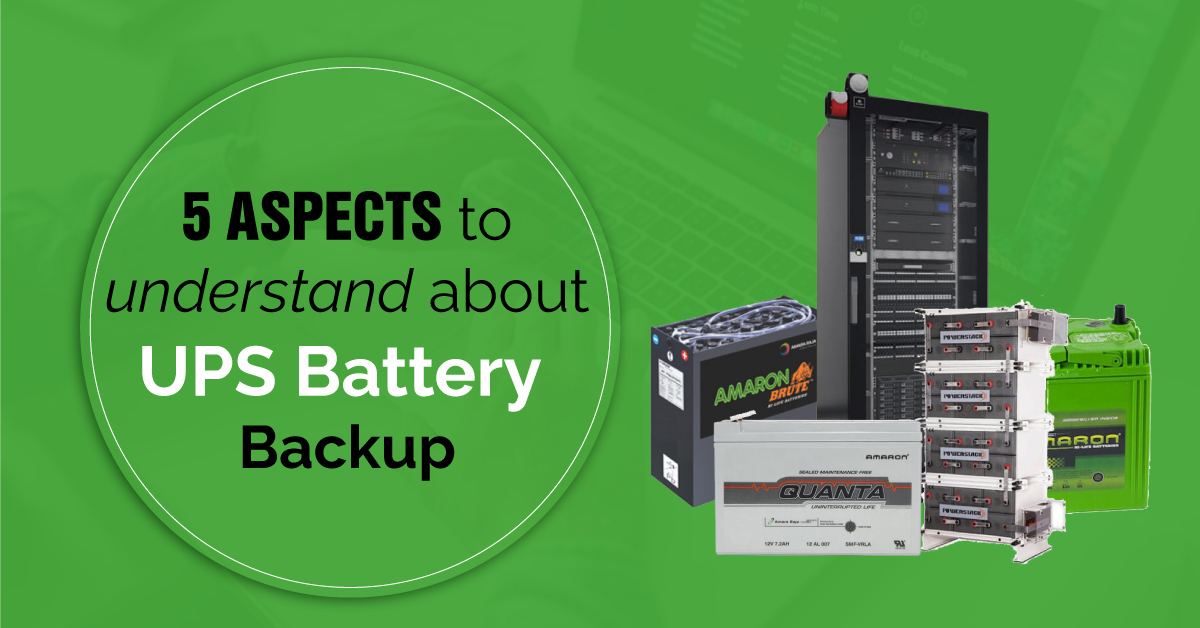
This electrical device provides emergency power if the primary power source fails or malfunctions. A UPS battery backup is an example of this. A UPS is a most commonly used device to protect computers, data centers, and telecommunications equipment from an unexpected power outage that could result in human injury, deaths, severe business fluctuations, and data loss. A growing industry, fueled by technological and automation advancements, necessitates every bit of infrastructure support it can get. Everything from IT infrastructure and computer systems to manufacturing and retail operations depends on a UPS battery backup system.
As a backup battery, a surge protector, and an inverter, the UPS performs all three functions in one device. If a power fluctuation, outage, or other disturbance occurs, the backup battery and power inverter provide power to your connected devices. With a UPS, you can protect yourself from frequency noise/variation, voltage spikes/surges, and harmonic distortion.
It's a must-have for both businesses and homes because of its versatility. Because of this, it is critical to comprehend the following details about UPS battery backups:
A UPS is necessary because electronic equipment can be expensive, and malfunctions are inevitable. Uninterruptible power supplies (UPSs) are an excellent choice for any device powered by a standard wall outlet, including wireless networking equipment, computers, televisions, gaming consoles, and servers.
Even if they last only a few nanoseconds, voltage spikes can cause severe damage to attached hardware. Circuit boards, hard drives, and most other electrical components are fried when too much electricity is used.
Your data can be saved or backed up, and sensitive electronic devices shut down safely with the help of a UPS backup battery. A backup battery's power capacity can buy you time to start up power generators or provide power for as long as it takes to restore alternating current.
Back-UPS functionality is sought after for a variety of reasons. Some users could use this backup to save important work or documents before shutting down their computers. In contrast, others would prefer the ability to continue working on their computers during the power outage. Remember that the number of watts the system supports affects battery supply time: a lower wattage load connected to the system will extend battery life by more.
Standby Design, Line Interactive Design, and Double Conversion System are smart UPS systems. The most common types of power problems and the different types of UPS systems that can handle them are described in detail below.
Surge: A brief and sharp increase or decrease in the voltage applied to a circuit. A surge can be handled by any of the three systems listed above.
Black out: Weather conditions, accidents, utility power shortages, and grid failures are common causes of blackouts. All three types of UPS systems are capable of surviving a power outage.
Over Voltage: Any time the incoming voltage exceeds the standard, it is known as an over-voltage condition (OVD). Both Line Interactive and Double Conversion Systems are capable of addressing this issue.
Frequency Variation: Increased fluctuations in generator output and power frequency can cause frequency variation. Only Double Conversion designs are capable of correcting this issue.
Line noise: A circuit's performance can be disrupted or degraded by noise on the frequency line. A Double Conversion design is the only way to solve this issue.
An intelligent UPS battery life degrades over time, necessitating a replacement about every three years. To warn users when the battery is running low, the system will make an electronic chirping noise and flash a red light. To safely dispose of the battery, it is likely to be made of lead acid.
Make sure the UPS system you buy from Emerson UPS dealer has enough capacity to handle your devices' wattage and enough battery runtime to shut down safely. Regardless of the type of UPS system you purchase, The number of plugs on your UPS should also be considered.
It's easy to figure out how much power your UPS will need by multiplying the wattage of all the devices you'll be connecting to it by 1.25. Your UPS system's capacity should not be exceeded by more than 75% to 80%. In that case, ensure that the number of plugs is greater than or equal to the number of devices you intend to connect.
Remember that a UPS can never be used to its total capacity, and the closer you get to power, the less battery runtime you can expect. Consider how long it will take to safely shut down all of your connected devices when determining the capacity of your UPS system. Additional battery modules (EBMs) are available from some UPS manufacturers if runtime is a concern.
Hopefully, this has helped you make an informed decision about your UPS purchase. All of the leading UPS battery backups are available at Universal Power System. We understand the importance of regularly backing up your work, whether it's in your home office or your data center.